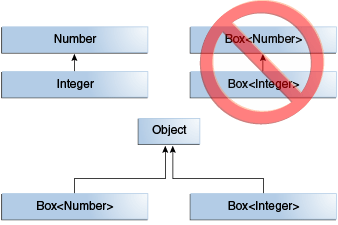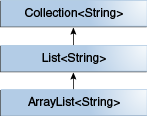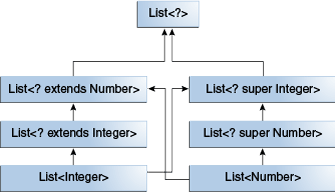14주차 과제: 제네릭
📌 목표
자바의 제네릭에 대해 학습하세요.
📌 학습할 것
- 제네릭 사용법
- 제네릭 주요 개념 (바운디드 타입, 와일드 카드)
- 제네릭 메소드 만들기
- Erasure
📜 시작에 앞서
- 백기선 님의 라이브 스터디(2020년 11월부터 2021년 3월까지) 커리큘럼을 따라 진행한 학습입니다
- 뒤늦게 알게 되어 스터디 참여는 못했지만 남아있는 스터디 깃허브 주소와 유튜브 영상을 참고했습니다
📑 제네릭 사용법
용어 정리
제네릭
- 클래스나 메서드에서 사용할 내부 데이터 타입을 외부에서 지정하는 방법
제네릭 타입
- 제네릭 클래스 or 제네릭 인터페이스 : 클래스와 인터페이스 선언에 타입 매개변수(type parameter)를 사용한 것
public class ArrayList<E> extends AbstractList<E> {
private transient E[] elementData;
public boolean add(E o){...}
public E get(int index){...}
...
}이외 관련 용어
| 한글 용어 | 영문 용어 | 예 |
|---|---|---|
| 매개변수화 타입 | parameterized type | List<String> |
| 실제 타입 매개변수 | actual type parameter | String |
| 제네릭 타입 | generic type | List<E> |
| 정규 타입 매개변수 | formal type parameter | E |
| 비한정적 와일드카드 타입 | unbounded wildcard type | List<?> |
| 로 타입 | raw type | List |
| 한정적 타입 매개변수 | bounded type parameter | <E extends Number> |
| 재귀적 타입 한정 | recursive type bound | <T extends Comparable<T>> |
| 한정적 와일드카드 타입 | bounded wildcard type | List<? extends Number> |
| 제네릭 메서드 | generic method | static <E> List<E> asList(E[] a) |
| 타입 토큰 | type token | String.class |
출저: 이펙티프자바 3/E
사용 이유
제네릭 사용 전 코드
public class ArrayList extends AbstractList {
private transient Object[] elementData;
public boolean add(Object o){...}
public Object get(int index){...}
...
}
ArrayList squareList = new ArrayList();
squareList.add(new Square());
squareList.add(new Triangle()); //Object로 리스트에 들어간다
Square square = (Square) squareList.get(0); //꺼낼때 형변환 필요
Square square1 = (Square) squareList.get(1); //ClassCastException제네릭 사용 후 코드
public class ArrayList<E> extends AbstractList<E> {
private transient E[] elementData;
public boolean add(E o){...}
public E get(int index){...}
...
}
ArrayList<Square> squareList = new ArrayList<>();
squareList.add(new Square());
//squareList.add(new Triangle()); //컴파일 에러
Square square = squareList.get(0); // 꺼낼때 형변환 불필요- 컴파일 타임에 타입체크를 할 수 있게 해주어, 타입 안정성 제공
- 타입체크와 형변환을 제네릭 타입을 통해 컴파일러가 대신 해주기때문에 코드 간결해짐
사용법
제네릭 클래스 객체 생성
ArrayList<Fruit> fruitList = new ArrayList<Fruit>();
ArrayList<Fruit> fruitList1 = new ArrayList<>(); // 생략 간능 부분
//ArrayList<Fruit> fruitList2 = new ArrayList<Apple>(); //컴파일 에러-
타입 매개변수에 외부에서 지정할 타입인 매개변수화 타입(parameterized type)을 지정
-
생성자의 제네릭 타입은 컴파일러가 추정 가능할 경우 생략 가능
-
참조변수와 생성자에 지정하는 제네릭 타입은 일치해야 한다(어길시 컴파일 에러)
-
-
로 타입과 매개변수화 타입<Object> 지정의 차이
- 매개변수화 타입<Object> 지정은 모든 타입을 허용한다는 의사를 컴파일러에게 명확히 전달하는 반면, 로 타입은 제네릭 타입 정보가 전부 지워진 것처럼 동작(제네릭 이전 버전과 호환성 위해)
- 이는 제네릭이 안겨주는 안전성과 표현력을 모두 읽는 것
제네릭 클래스 선언
class MyGenericClass <T1, T2, ..., Tn> {
... //T1, T2 ... Tn 사용 가능
}
class MyGenericInterface <T1, T2, ..., Tn> {
... //T1, T2 ... Tn 사용 가능
}- 클래스명 뒤에 \<타입 매개변수> 작성을 통해 선언
- 여러 타입 매개변수 사용시
,로 구분
제네릭의 제한 사항
타입 소거 관련 내용이 많으므로 타입 소거 모른다면 이후 장에서 읽고 보길 추천
- 프리미티브 타입으로 제네릭 타입 인스턴스화 불가
Pair<int, char> p = new Pair<>(8, 'a'); // compile-time error
Pair<Integer, Character> p = new Pair<>(8, 'a');- 제네릭 타입은 타입 소거로 제네릭 타입의 타입 매개변수가 지정한 한정적 타입 매개변수 혹은
Object로 변경되는데, 프리미티브 타입은Object타입으로 형변환할 수 없기 때문에 Wrapper 클래스를 사용해야 한다
- 타입 파라미터로 인스턴스 생성 불가
public static <E> void append(List<E> list) {
E elem = new E(); // compile-time error
list.add(elem);
}new연산자는 힙 영역에 생성한 객체를 할당하는 데, 컴파일 시점에 타입 T가 뭔지 정확히 알아야 한다- 그럼 런타임에 제네릭 타입을 알아낼 수는 없을까?
- 타입 매개변수 정적 필드로 사용 불가
public class MobileDevice<T> {
private static T os; // compile-time error
}- 모든 객체에 대해 동일하게 동작하는
static필드에 코드 작성시 정적이지 않은 제네릭 사용시 혼란
- 매개변수화된 타입에 캐스팅과
instanceof연산자 사용 불가
//타입 소거로 매개변수 타입 정보 알 수 없기 때문에 불가
public static <E> void rtti(List<E> list) {
if (list instanceof ArrayList<Integer>) { // compile-time error
// ...
}
}
//비한정적 와일드 카드 타입 사용시 가능(매개변수 타입은 상관 없으므로)
public static void rtti(List<?> list) {
if (list instanceof ArrayList<?>) { // OK; instanceof requires a reifiable type
// ...
}
}- 매개변수화 타입으로 배열 생성 불가
List<Integer>[] arrayOfLists = new List<Integer>[2]; // compile-time error배열은 제네릭 타입, 매개변수화 타입, 타입 매개변수로 사용할 수 없다. 즉, 코드를 new List<E>[], new List<String>[], new E[] 식으로 작성하면 컴파일할 때 제네릭 배열 생성 오류를 일으킨다
제네릭 배열을 만들지 못하게 막은 이유는 무엇일까? 타입 안전하지 않기 때문이다. 이를 허용한다면 컴파일러가 자동으로 생성한 형변환 코드에서 런타임에 ClassCastException이 발생할 수 있다. 런타임에 ClassCastException이 발생하는 일을 막아주겠다는 제네릭 타입 시스템의 취지에 어긋나는 것이다.
List<String>[] stringList = new List<String>[1]; //허용한다고 가정
List<Integer> intList = List.of(42);
Object[] objects = stringLists;
objects[0] = intList; //타입 소거로 인해 가능
String s = stringList[0].get(0); //타입 안정성 깨짐출저: 이펙티브 자바 3/E
- 제네릭 타입의 예외에 관한 제약
//A generic class cannot extend the Throwable class directly or indirectly.
//For example, the following classes will not compile:
// Extends Throwable indirectly
class MathException<T> extends Exception { /* ... */ } // compile-time error
// Extends Throwable directly
class QueueFullException<T> extends Throwable { /* ... */ // compile-time error
//A method cannot catch an instance of a type parameter:
public static <T extends Exception, J> void execute(List<J> jobs) {
try {
for (J job : jobs)
// ...
} catch (T e) { // compile-time error
// ...
}
}
//You can, however, use a type parameter in a throws clause:
class Parser<T extends Exception> {
public void parse(File file) throws T { // OK
// ...
}
}- 타입 소거 후 메서드 시그니처가 같아지는 메서드 오버로딩 불가
public class Example {
public void print(Set<String> strSet) { }
public void print(Set<Integer> intSet) { }
}- 위 두 메서드는 타입 소거 후에 메서드 시그니처가 완전히 같으므로 다른 메서드라 확인할 수 없다
📑 제네릭 주요 개념 (바운디드 타입, 와일드 카드)
바운디드 타입
- 타입 매개변수에 지정할 타입을 제한하고 싶을 떄 사용
class MyGenericClass <T1 extends X> {
...
}- 타입 매개변수에
extends키워드 사용해 상위 바운드 설정extends X로 상위 바운드 제한할 경우, 해당 제네릭 객체 생성시 매개변수화 타입으로 X 클래스나 인터페이스의 자손만 가능- 여러
extends조건 부여시&로 구분
- 상위 바운드에 해당하는 클래스나 인터페이스의 메서드를 제네릭 클래스에서 사용 가능
- 타입 매개변수가
<T>일 경우 해당T의 역할(메서드)에 대해 알 수 없다 - 타입 매개변수가
<T extends Comparable>같은 경우 해당T가compareTo()를 구혔했음을 알기 때문에compareTo()같은 메서드 사용 가능
- 타입 매개변수가
제네릭의 상속과 하위 타입
List<Integer> integerList = new ArrayList<>();
List<Number> numberList = integerList; //매개변수화 타입에 따른 상속관계 성립한다면?
numberList.add(12.34);
Double d = intgerList.get(0); //???- 만약 매개변수화 타입의 상속관계에 따라 생성한 제네릭 객체의 상속관계가 성립한다면?
- 위 코드에서 알 수 있듯이 마지막에 타입 안정성이 깨지며 제네릭 사용 이유가 없어진다
- 매개변수화 타입의 상속관계가 성립한다고 해서 제네릭 객체간의 상속관계가 성립하지는 않는다
- 반면 코드의 첫 번째 줄처럼 로 타입 간의 상속관계는 성립 한다



와일드 카드
- 위의 "제네릭의 상속과 하위 타입"에서 알 수 있듯이 제네릭에서 로 타입간 상속관계는 성립하지만 제네릭의 매개변수화 타입에 따른 상속은 성립하지 않는다
- 이때 제네릭의 매개변수화 타입에 따른 다형성을 활용하기 위해 와일드 카드 사용
| 명칭 | 형식 | 매개변수화 타입 범위 |
|---|---|---|
| Unbounded Wildcards | <?> | 제한 없음 |
| Upper Bounded Wildcards | <? extends UpperBound> | UpperBound와 그 서브클래스만 가능 |
| Lower Bounded Wildcards | <? super LowerBound> | LowerBound와 그 슈퍼클래스만 가능 |
//와일드 카드 사용 전
static void printListWithObject(List<Object> list) {
for (Number e : list) {
System.out.println(e);
}
}
//와일드 카드 사용 후
static void printListWithWildcard(List<? extends Number> list) {
for (Number e : list) {
System.out.println(e);
}
}
//
public static void main(String[] args) {
List<Integer> list = new ArrayList<>();
list.add(1);
//printListWithObject(list); //컴파일 에러
printListWithWildcard(list);
}- 매개변수화 타입의 상속관계가 성립한다고 해서 제네릭 객체간의 상속관계가 성립하지는 않기 때문에
printListWithObject(List<Object> list)메서드의 파라미터로List<Integer>를 넣을 수 없다 - 와일드 카드 사용시
List<? extends Number>로Number와 그 서브클래스로 매개변수화 타입을 허용했으므로List<Integer>을 파라미터로 해당 메서드 사용 가능
List<? extends Integer> intList = new ArrayList<>(); //아래와 같이 자동 형변환
List<? extends Integer> intList = (List<? extends Integer>) new ArrayList<>();- 와일드 카드 사용으로 상속관계가 아래 이미지 처럼 변하는데, 따라서 위와 같이 다형성 활용 가능


📑 제네릭 메소드
- 타입 매개변수를 사용하는 메서드
제네릭 메서드 만들기
class GenericClass<T> {
...
public <T> boolean genericMethod(T param){
...
}
}
class MyClass {
...
public <T> boolean genericMethod(T param){
...
}
static <T> void genericMethod(List<T> list){
...
}
}- 메서드의 반환 타입 앞에 타입 매개변수 작성을 통해 제네릭 메서드로 만든다
- 타입 매개변수의 scope는 해당 메서드 내로 한정
- 제네릭 클래스 안에 제네릭 메서드가 타입 매개변수를 같은 문자로 사용해도 이 둘은 별개로, 제네릭 메서드는 자신에게 가까운 타입 매개변수를 우선
static메서드도 제네릭 메서드로 만들 수 있다
제네릭 메서드 사용
boolean result = MyClass.<String>genericMethod("string");
boolean result = MyClass.genericMethod("string");- 호출시 명시적으로 타입 파라미터를 지정
- 컴파일러가 추정 가능할 경우 생략 가능
📑 Erasure
- 컴파일 타임에는 타입을 검사하는 것과 달리 런타임에는 타입 정보를 지워 알 수 없다
- 컴파일된 파일에는 지네릭 타입에 대한 정보가 없다는 것
제네릭을 구현하기 위해 자바 컴파일러는 다음 유형 삭제를 적용
- 제네릭 타입의 타입 매개변수를 지정한 한정적 타입 매개변수 혹은
Object로 변경- 타입 매개변수를 제한하지 않을 경우(unbounded)
Object로 변경 - 따라서 생성된 바이트코드에는 일반 클래스, 인터페이스, 메서드만 포함
- 타입 매개변수를 제한하지 않을 경우(unbounded)
- 타입 안전성을 유지하기 위해 필요한 경우 형변환 삽입
- 확장 된 제네릭 타입에서 다형성을 보존하는 브리지 메서드를 생성
- oracle java tutorial
//Consider the following generic class that represents a node in a singly linked list:
public class Node<T> {
private T data;
private Node<T> next;
public Node(T data, Node<T> next) {
this.data = data;
this.next = next;
}
public T getData() { return data; }
// ...
}
//Because the type parameter T is unbounded, the Java compiler replaces it with Object:
public class Node {
private Object data;
private Node next;
public Node(Object data, Node next) {
this.data = data;
this.next = next;
}
public Object getData() { return data; }
// ...
}
//In the following example, the generic Node class uses a bounded type parameter:
public class Node<T extends Comparable<T>> {
private T data;
private Node<T> next;
public Node(T data, Node<T> next) {
this.data = data;
this.next = next;
}
public T getData() { return data; }
// ...
}
//The Java compiler replaces the bounded type parameter T with the first bound class, Comparable:
public class Node {
private Comparable data;
private Node next;
public Node(Comparable data, Node next) {
this.data = data;
this.next = next;
}
public Comparable getData() { return data; }
// ...
}관련 추가 링크
📑📌📜✏️

